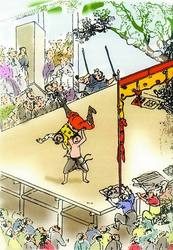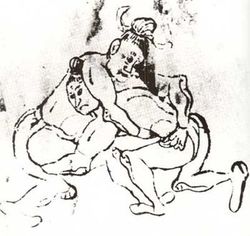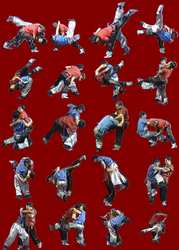Jiao Di/Xiang Pu - Wrestling
History
In Qin dynasty(221BC-206BC), Emperor Qin Shihuang played a critical role to innovate and popularize it. After united all kingdoms and states in China in 221BC, he introduced Jiaodi into royal palace, and turned it from a sport competition game embracing strength and skills into an entertainment activity known as Jiaodi drama. Besides, to prevent people rise against him, Emperor Qin Shihuang destroyed all the weapons in China and ordered the Jiaodi participants stop to wear the bull horns and wrestle with each other by hands. He also collected folk music and dance nationwide, which paved the way for the prosperous of art in later dynasties. Jiaodi drama, which was more an entertainment activity than a competitive sport during Qin dynasty evolved into a comprehensive performance later. In 1975, a wood comb was discovered in Hubei province, which is a masterpiece depicting two Jiaodi drama performers in Qin dynasty. The reign of Qin Shihuang was fleeting. However, its influence is immeasurable and lasting.
During Han dynasty(206BC-220BC), Jiaodi penetrated into the lower class of society. People cherished so much passion for this entertainment that they would cover hundreds of miles to see the government-runned Jiaodi drama. In the Jiaodi Drama, two participants usually wear make-up before they perform in public. The basic features of wrestling came into being in this period. In 1970s, one piece of silk embroidery of Han dynasty was unearthed, which depicts two Jiaodi participants ready to fight each other. The entertainment function of it still outweighed that of sports competition is this period. A comprehensive art form embracing folk dance, folk music, acrobatics, martial art and magic emerged during this period, which was known as Baixi (literally mans variety show, Baixi is the counterpart of Yayue: the elegant music played in royal palace). Emperor Huan Wudi established a music organization named Yuefu at this period. Against the background of enhanced cultural and artistic exchange between middle and western China thanks to the opening of Silk Road, Baixi drama took in Jiaodi drama and prospered unprecedentedly. Royal families started to launch large-scaled Baixi performances also. The most renowned Jiaodi drama in this period is Mr Huang Of East Sea. Here goes the plot: In the end of Qin dynasty (221BC-206BC), a magician named Mr Huang went to East Sea to kill a white tiger. Unfortunately, his magic powers disappeared the moment the tiger jumped into him. Thus he was killed by the tiger. Featuring fixed figures, plots, conflictions and ending, this is thought to be the earliest drama in China, and Baixi is considered as the cradle of Chinese drama by experts.






